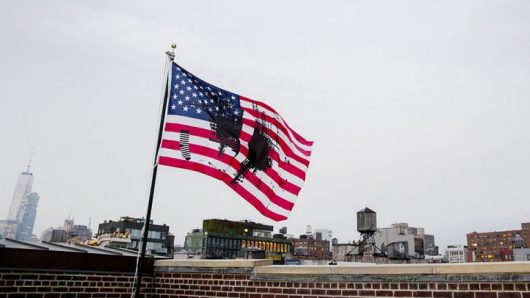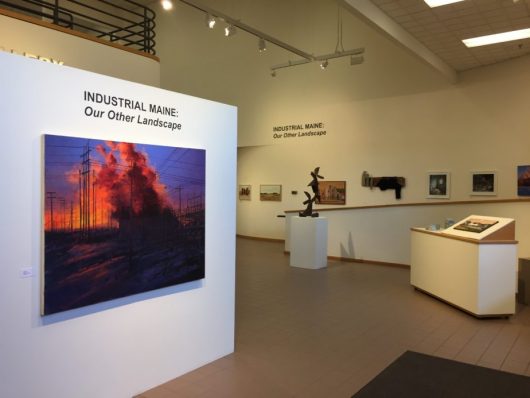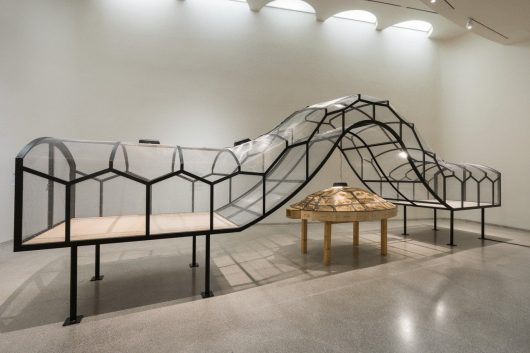A Selective Timeline of Art Censorship from 1989 to the Present
Art and culture are popular targets of censorship. NCAC’s Art and Culture Censorship Timeline shows you how art and cultural censorship have evolved over time.
2025
Following Mayoral order, the Montgomery Museum of Fine Arts removes a commissioned billboard project by the collective For Freedoms, because the mayor claims it is politicizing and divisive, January 2025: NCAC writes the mayor and argues that while he may not agree with the politics or vision of the artists behind the billboard, his oversight of the museum does not mean he has the right to impose enforce his personal perspective on the museum’s programming.
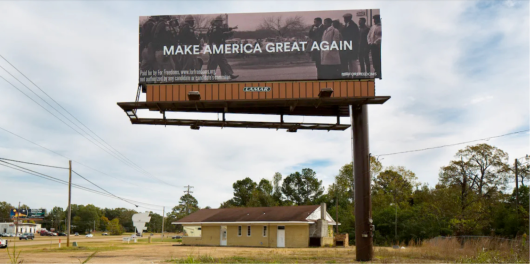
For Freedoms’s billboard as it was exhibited in 2016 in Pearl, Mississippi. Courtesy For Freedoms
2024
Indiana University cancels an upcoming retrospective exhibition of renowned Palestinian-American abstract painter, Samia Halaby citing “security concerns” related to the artist’s political statements in support of Palestine expressed on Instagram, January 2024. NCAC writes to the university and argues that it is the role of our nation’s institutions of higher education to find ways to present and educate on the work of politically engaged artists during politically polarized moments, and that the censorship of the work betrays artistic and academic freedom.
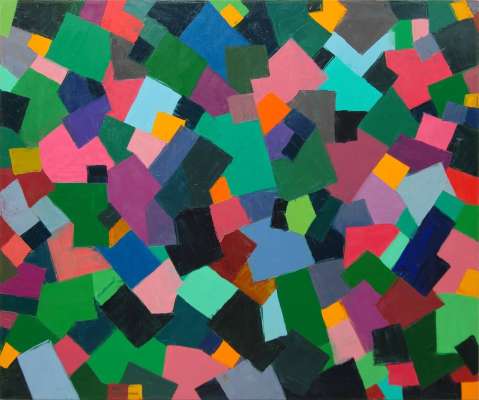
Samia Halaby, Pink Walking Green, 1983.
After unacknowledged delays following calls for protest, Public Art of the University of Houston System completes Shahzia Sikander’s exhibition installation, March, 2024: After facing protests from local religious groups during the exhibition’s initial installation and canceling the exhibition’s opening events over the supposed “unavailability of all parties,” Public Art of the University of Houston System (UHS) commits to completing Shahzia Sikander’s exhibition Havah… to breathe, air, life. Critics of the exhibition assert that it is “satanic,” because of the central sculpture’s ram horns and tentacles, even though the artist’s statement explains at length their symbolic connection to themes of justice, strength, and rootedness. Concerns remain over Public art UHS’ initial response, which also includes the publishing of a FAQ without consulting the artist, and which foregrounds the protesters’ perspective. The National Coalition Against Censorship offers its expertise and resources to assist Public Art UHS in navigating the successful installment and display of “controversial” artwork.
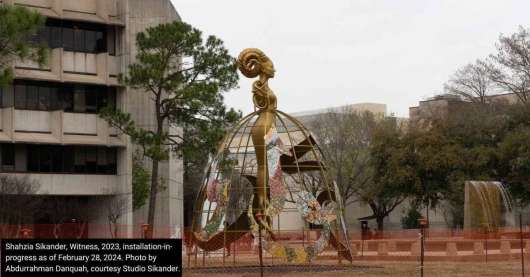
Update: In July 2024, the artwork Witness, part of the exhibition Havah… to breathe, air, life by Shahzia Sikander, was beheaded while on display at the University of Houston.
An artist residency exhibition at Craft Alliance is canceled because it includes a glass dish with a keffiyeh pattern on it, glass watermelon seeds branded with the phrase “land back” and the titles “From the River to the Sea” and “Indigenous to Palestine,” July 2024: The alliance claims that the artwork contains “antisemitic imagery and slogans calling for violence and the destruction of the Jewish state of Israel.” In a statement about the incident, NCAC advocates for cultural institutions to take the concerns of audiences seriously, but to use internationally approved criteria when deciding if a work, indeed, constitutes incitement to violence.
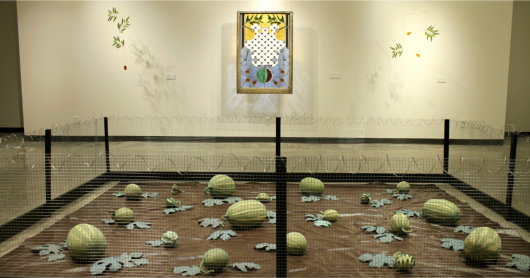
Dani Collette and Allora McCullough, Planting Seeds, Sprouting Hope, 2024, Installation view.
The City Council of Lubbock, Texas Cuts Funding for Lubbock’s First Friday Art Trail, May 2024: The decision was made due to some city council members’ views that drag and LGBTQ-related performances and workshops at FFAT, including those aimed specifically at young audiences, constitute an “inappropriate use of taxpayer funds.” In a statement response, the National Coalition Against Censorship emphasizes that Public art funding should, by its designation, serve the public in all its eclectic interests, and such offerings should not be limited to any given politician’s personal taste and subjective evaluation of what is or is not “appropriate”.
Following criticisms from lawmakers about an exhibition examining social and political issues, East Tennessee State University requires visitors of its Reece Museum to sign liability waivers, puts up warning signs around the art, and hangs curtains to prevent viewing, December 2024: In response, the National Coalition Against Censorship issued a statement pointing out that the university’s measures do little to contextualize the show but rather tells viewers how those in political power want them to view the exhibition.
2023
Following student complaints, Macalester College temporarily closes an exhibition of work by Iranian-American artist Taravat Talepasand, and shrouds the glass walls of the gallery in black curtains because some students on campus claim the artist’s work is offensive and disrespectful of Islamic culture, February, 2023: The exhibition reopens with frosted gallery windows to prevent “nonconsensual viewing” and student protesters are permitted to post protest signage on the gallery doors, alongside a prejudicial exhibition content advisory. The National Coalition Against Censorship urges school officials to seek to create educational opportunities by exploring the controversial elements of the exhibition publicly and in-depth, and remove biased signage from the gallery doors, which warns students of its contents.
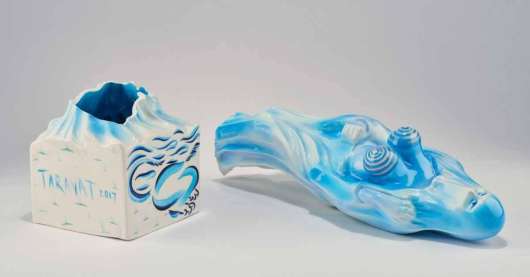
Taravat Talepasand, Demons, Dictators, Blasphemy, and Man, 2016.
Lewis-Clark State College removes several artworks about reproductive healthcare from an exhibition for fear of violating the state’s No Public Funds for Abortion Act (NPFAA) March, 2023: The NPFAA prohibits the use of public funds for abortion, including speech that would “promote abortion” or “counsel in favor of abortion.” The censored artworks include Lydia Nobles’ video interviews of individuals who have sought and/or received reproductive healthcare, including abortions; Katrina Majkut’s embroidered works depicting abortifacients; and Michelle Hartney’s transcriptions of letters to 20th century healthcare pioneer Margaret Sanger. The college’s interpretation of the law demonstrates the potential abuses of the Act. The National Coalition Against Censorship condemns the college’s decision to exclude artwork addressing personal viewpoints on reproductive care and urges the college to reconsider its decision.
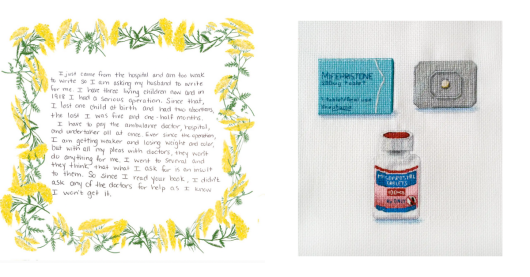
Michelle Hartney, Unplanned Parenthood, 2022-23 and Katrina Majkut, Medical Abortion, 2015.
City officials in Mesa, Arizona postpone all of the Mesa Art Center’s Fall exhibitions for up to one year after failing to convince center staff to remove Shepard Fairey’s work My Florist Is a Dick from the artist’s solo exhibition checklist, October, 2023: The work depicts a police officer in riot gear holding a large flower, alongside text that reads “My Florist is a Dick” raising concerns that it would cause offense to municipal police officers. In a joint letter, the National Coalition Against Censorship and the ACLU of Arizona demand that officials continue with the exhibition as originally planned. The exhibition opens only slightly later than originally intended and includes the contested work.
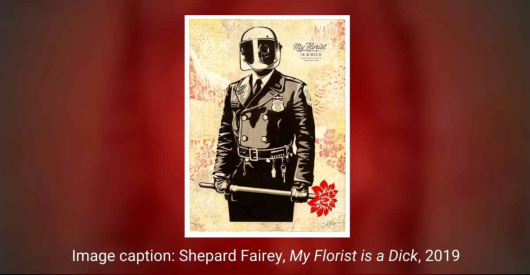
Shepard Fairey, My Florist Is A Dick, 2019.
In October 2023, Hamas attacks Israel. Within weeks Israel begins ground operations in Gaza.
The Wexner Center for the Arts cancels the Director’s Dialogue on Art and Social Change with Palestinian artist Jumana Manna, stating that “Due to current world events, we do not feel this is the right time to have conversations about a region at war,” October, 2023. At the time, Manna, whose work examines and critiques Israeli policies against Palestinians, was exhibiting at the Wexner.
El Museo del Barrio refuses to display a commissioned Dia De Los Muertos altar by Odalys Burgoa and Roy Baizan work after the artists include a Palestinian flag in it, November 2023. While the museum claims the artists were making a political statement not included in their proposal, NCAC notes that the artists’ proposal was steeped in language of politics and activism, and that any prohibition on “political content” would betray El Museo’s history of displaying artwork that reflects political and activist positions.
2022
Student artwork with LGBTQ themes is removed from Georgia school, February, 2022: School officials at an Elementary School in Athens, Georgia, remove a student artwork from the classroom because it celebrates gay rights, Officials likened the mural’s depiction of a rainbow flag to that of a swastika. In response, the National Coalition Against Censorship writes to the Board of Education to urge the district to return the artwork to public display, apologize to the student, and take steps to ensure that students are permitted to express their political and personal beliefs in school, including in their artwork. An apology is later issued to the student, and the Board of Education calls for a meeting to rethink equity issues in their curriculum.
In February 2022, Russia invades Ukraine.
Major US cultural institutions boycott Russian artists as a display of symbolic opposition to the Russian invasion of Ukraine, March 2022: The Metropolitan Opera cancels scheduled appearances of conductor Valeri Ghergiev and soprano Anna Netrebko.
In June, 2022, the U.S. Supreme Court officially reverses Roe v. Wade on Friday, declaring that the constitutional right to abortion no longer exists.
San Francisco Public Library cancels an exhibition because it includes a work depicting protesters holding various signs, including one that reads “Zionism is Racism,” October, 2022: The National Coalition Against Censorship urges the San Francisco Public Library to uphold its duties as a public institution to foster dialogue and to serve both the critics of the work, as well as the artists and those who agree with it.
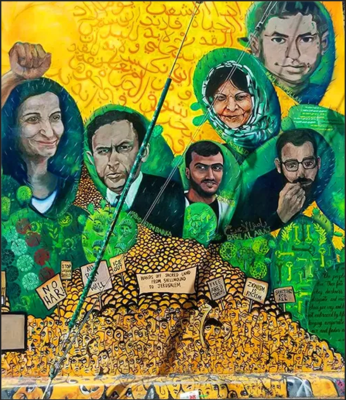
Art Forces, Arab Resource Organizing Center (AROC), and Arab Youth Organizing (AYO), The Arab Liberation Mural, 2018.
The Orange County Museum of Art cancells invitation for Ben Sakoguchi’s 16-panel painting in the museum’s California Biennial: Pacific Gold, September 2022. Museum leadership claims that the swastikas in the work, Comparative Religions 101, would make some patrons “uncomfortable, upset, [or] triggered,” even though the work casts a critical view of Nazism. Later the Museum reinvites the work to the exhibition; however, the artist declines.
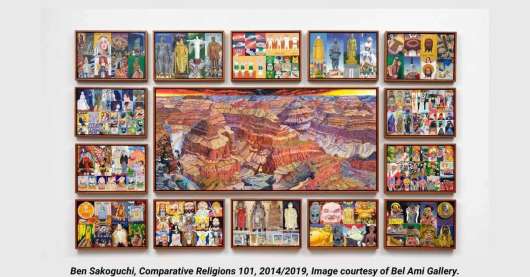
Ben Sakoguchi, Comparative Religions 101, 2014/19. Courtesy Bel Ami Gallery
2021
The Walt Disney Family Museum removes two works from The Veterans’ Voices: Painted Realities exhibition, which features work by African American, rural, and deported veterans, May, 2021: One of the works refers to police violence, the other features a devil-like figure. In Response, NCAC emphasizes that the museum has failed to provide an open and equitable cultural sphere by censoring the voices of underrepresented veterans.
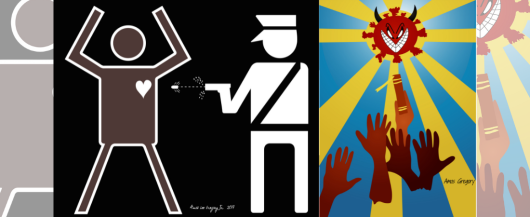
Amos Gregory, Truth of the Matter, 2017, and Amos Gregory, Blinded by the Light, date unknown.
Brooklyn elementary school censors student mural echoing themes of racial equality, August 2021: An elementary school in Brooklyn removes a mural created by fifth graders on the grounds that it is “too divisive” and not “inclusive” enough because it depicts a Black Trans Lives Matter sign and a quote from author Audre Lorde that states, “Your Silence Will Not Protect You.” NCAC and PEN America write to the NYC Department of Education, explaining that silencing student expression solely due to dislike of its viewpoint contradicts free speech principles and violates the school’s First Amendment obligations.16 November, 2021: In response to the National Coalition Against Censorship’s letter, Executive Superintendent of Brooklyn North NYCDOE Borough Office Karen Watts acknowledges that the mural should not have been removed.
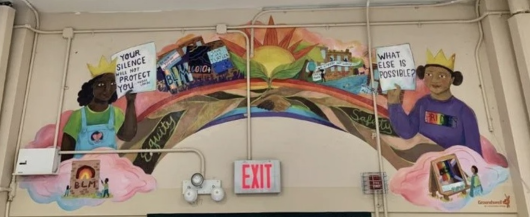
Elementary School Mural, Brooklyn, NY, 2021
2020
In March 2020, museums and galleries close their doors because of the COVID pandemic.
NCAC convenes an international coalition of arts and free expression organizations and artist-activists, that together launches Don’t Delete Art, an advocacy project drawing attention to the censorship of art online, May 2020: The project calls for a clear set of principles governing how social media companies handle artistic content on their platforms, raises awareness about the prevalence and nature of online art censorship, and advocates for a more tolerant and inclusive digital environment for artists.
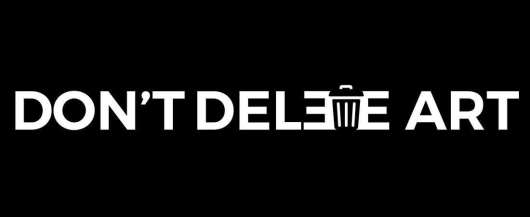
In May 2020, Black Lives Matter protests against police brutality and racism emerge across the country in the wake of the police killing of George Floyd. Many art institutions sign statements in support of fighting racism.
In response to student protests, the University of Kentucky announces plans to remove a controversial 1930’s-era mural by Ann Rice O’Hanlon depicting a history of Kentucky that critics claim sanitizes slavery and presents demeaning stereotypes of people of color, June, 2020: NCAC opposes the censorship of O’Hanlon’s mural and emphasizes that its removal would also negate the installation by noted Black artist Karyn Olivier that was commissioned in 2018 to respond to O’Hanlon’s mural. In 2024 a court rules that the mural should stay in place as moving it will destroy it.
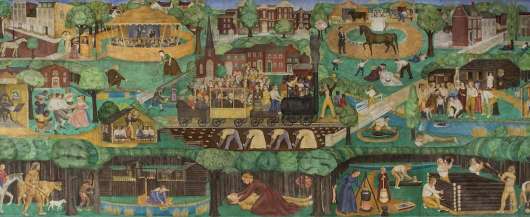
Ann Rice O’Hanlon, Memorial Hall Mural, 1934
2019
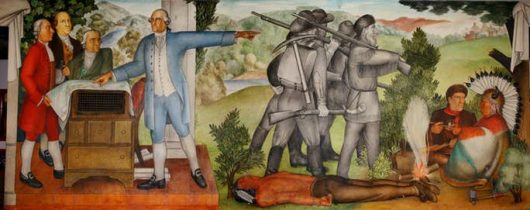
One of Arnautoff’s murals depicts George Washington pointing westward over the dead body of a Native American. (Photo: Dick Evans, CC BY 4.0)
- San Francisco Unified School District (SFUSD) votes to remove 1930s Works Progress Administration (WPA) murals at George Washington High School. June 25, 2019: At issue are depictions of George Washington’s slaves and violence against Native Americans. The murals, created in fresco by Russian-American social realist painter Victor Arnautoff, can only be removed by the irreversible act of destroying them. Complaints about the murals first arose in the 1960s, leading the school to commission murals from artist Dewey Crumpler to offer positive imagery of people of color. But a 2017 proposal to designate George Washington High School as a historical landmark reignited calls for the murals to be removed. The school convenes a Reflection and Action Group which recommends that the murals be removed. Arts advocates and anti-censorship organizations, including NCAC, call for additional educational programming around the murals. The murals’ critics argue that Black and Native American students are traumatized by these images of the historical violence and oppression of their ancestors. Advocates for preserving the murals maintain that this art must be considered in its historical and social context and that arguments for removal do not give students enough credit for their ability to grapple with complexity. August 13, 2019: The San Francisco Unified School District votes to reverse their decision to destroy the murals and to instead cover them with panels. More details available here.
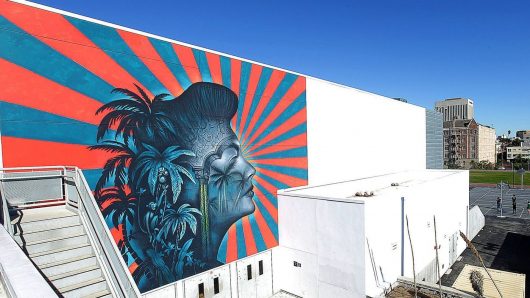
Beau Stanton’s mural at the RFK Community Schools complex.
- Los Angeles School Plans to Whitewash Mural That Offends Korean Activists. December 2018: The superintendent of a Los Angeles school district (LAUSD) unilaterally decides to remove a mural from the exterior wall of a high school gym. The National Coalition Against Censorship (NCAC) disagrees with this decision and urges the school district to reconsider. The mural, by artist Beau Stanton, was created as part of an arts initiative at the school, which involved workshops and seminars with students. The Kennedy Foundation grant-funded mural was vetted by the school district and intended as an homage to actress Ava Gardner. The radiating design element is found in many of Stanton’s murals. Some community members represented by the Wilshire Community Coalition are offended by the rays, which they associate with the Japanese imperialist Rising Sun flag, and call for the erasure of the entire mural. In late December, LAUSD postpones its plans to remove the mural until after the holidays. In late May 2019, after intervention from artists, advocates and community groups, a compromise is reached that will allow the mural to remain with Stanton overseeing changes to the work.
2018
- Pulphus, et al v. Stephen Ayers is dismissed by the D.C. Circuit court. Nov. 30, 2018: the D.C. Circuit dismissed the lawsuit as moot because the 2016 art competition—and its corresponding Capitol exhibition have ended—so there was no longer any injury for the court to redress. In its opinion in Pulphus v. Ayers, the court rejected Pulphus’s arguments that the case continues to present a live controversy, finding the case moot.
- Kansas Governor Jeff Colyer and Secretary of State Kris Kobach separately pressure officials at the University of Kansas (KU) to remove an art display, threatening the free expression of the artist, curator and KU students. July 2018: The artwork, Untitled (Flag 2) by Josephine Meckseper, is part of a year-long installation organized by Creative Time that included sixteen commissioned flags by different artists simultaneously displayed at partner sites nationwide. Meckseper’s work is a collage of an American flag and an abstract painting of the contours of the United States divided in two, symbolizing current national polarization. Deeming the piece a “desecration” of the flag, Colyer and Kobach publicly called for its removal. NCAC joins the Foundation for Individual Rights in Education (FIRE) and the American Civil Liberties Union (ACLU) of Kansas in a letter to the University of Kansas (KU) strongly urging it to take a stand against censorship by restoring the work.
- The University of Southern Maine (USM) removes three works from “Industrial Maine: Our Other Landscape,” following a complaint citing the painter’s previous conviction for sexual offenses. May-June 2018: The empty spaces left by the removed works, part of an exhibit at USM’s Lewiston-Auburn campus, are left empty by the curator. University officials do not comment further. Previously identified in media reports, Bruce Habowski is a well-regarded oil painter whose works have appeared in the Portland Museum of Art and the Center for Maine Contemporary Art, among others. He was convicted of unlawful sexual contact in 1999 and served a jail sentence. NCAC issues a statement that the removal of three paintings is a disturbing violation of academic and curatorial freedom.
2017
- An abrupt policy change by the US Department of Defense prohibits art created by detainees at Guantanamo Bay from leaving the base, even in the event of a detainee’s release. November 2017-January 2018: This new policy appears to have been inspired by an exhibition of artwork created by detainees, hosted at John Jay College of Criminal Justice in New York. The policy is the subject of an official letter sent by NCAC and 10 co-signatories to President Donald Trump; Secretary of Defense James Mattis; Deputy Secretary of Defense Patrick Shanahan; US Navy Commander, Rear Admiral Edward Cashman; and US Marine Corps Sergeant Major Dennis Bradley. The letter warns that the new policy flagrantly stifles any public discussion that could arise from viewing the art, and therefore the artistic and human side, of Guantanamo detainees. Art that has previously left the base has been subjected to intense military scrutiny before being cleared for release. Absent security concerns raised by that review, this policy also violates the human rights of the detainees under international norms. Further, the directive suppresses documents of clear political and historical importance to the American public.
- The Guggenheim Museum in New York, after a week of resisting calls for the removal of three works from Art and China after 1989: Theater of the World, announces that it will pull the works from the exhibition. September 2017: These include two videos documenting performances with live animals in 1994 and 2003, and a sculpture that replicates a 1993 work including live insects, snakes and lizards. Their removal came in response to “repeated threats of violence” and “concern for the safety of its staff, visitors and participating artists.” NCAC issues a statement calling out the Guggenheim’s alarming action as part of a growing worldwide trend in which threats of violent protest are silencing artistic expression and posing a danger to free speech in general.
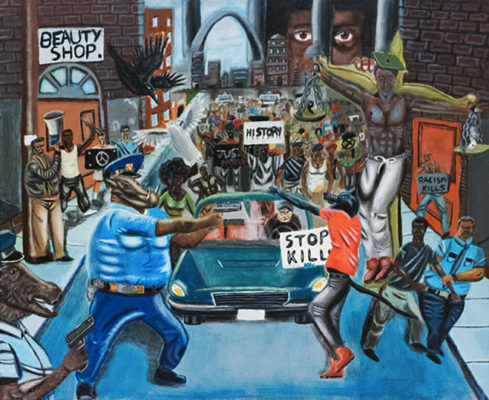
‘Untitled #1,’ by David Pulphus
- Congressmen Remove Student Painting from Exhibition on Capitol Hill, Provoking Lawsuit, January-April 2017: Republican lawmakers repeatedly remove, without permission, an allegorical painting by high school student David Pulphus from an annual art exhibition at the U.S. Capitol. Representative Lacy Clay (D-MO) restores the painting each time it is removed. The Architect of the Capitol sides with Republican representatives who argue that inclusion of the the painting breaks the art competition’s guidelines forbidding works that depict “subjects of contemporary political controversy.” A dozen free speech organizations condemn the decision; Rep. Clay files a lawsuit in federal court, but the judge upholds the painting’s removal. In May 2018, Pulphus and Congressman Clay filed an appeal. Additional info: Judge Upholds Removal of Student’s Controversial Painting from U.S. Capitol; Capitol Painting Lawsuit Doomed, Legal Scholars Say
- American University Removes Sculpture of Leonard Peltier from Grounds of Katzen Center Museum, January 2017: American University in Washington, D.C. removes a sculpture installed in front of the AU Museum and Katzen Arts Center after reporting complaints and violent threats from outside groups, including an association of FBI officers. The 9-foot sculpture by California artist Rigo 23 is based on a self-portrait by incarcerated Native American activist Leonard Peltier. The installation of the sculpture was timed to coincide with Peltier’s latest application for clemency, and with a symposium for the Peltier Defense Committee hosted by the University’s law school.
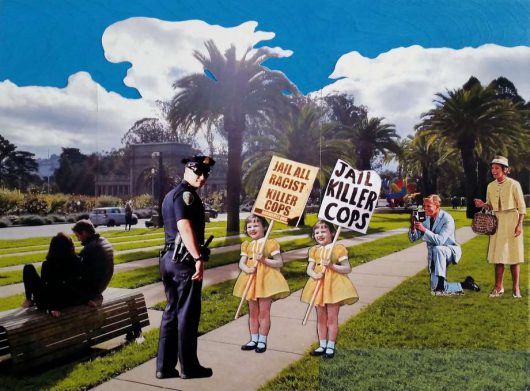
‘Proverbs 22 v.6.’ by Mark Harris
- San Jose School District Removes Artist Solo Exhibition About Race, February 2017: An exhibition of paintings by San Francisco artist Mark Harris celebrating Black History Month is removed from the lobby of an East Side Union School District building by the school district’s superintendent, due to ‘complaints.’ Harris’ eleven paintings depict the African American experience and the history of racial injustice. Despite pressure from free speech groups, the works are not restored.
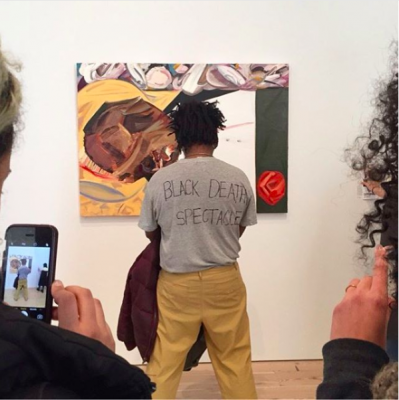
Whitney Biennial: Parker Bright protests Dana Schutz painting
- Whitney Museum Faces Protests and Call to Remove Painting by Dana Schutz Depicting Open Casket of Emmett Till, March 2017: The opening of the latest edition of the Whitney Biennial is met with protests over the painting “Open Casket” by Dana Schutz, that takes as its subject an iconic photograph of Emmit Till lying in his casket after being brutally murdered. The artist Parker Bright stands in front of the painting to block it from view while wearing a t-shirt that reads “Black Death Spectacle,” and British bi-racial artist Hannah Black posts a letter and petition calling for the painting’s immediate removal and destruction. A heated debate ensues across mainstream media, art outlets and social media platforms. The museum does not remove the painting.
- Burnsville Minnesota Arts Center Cancels Play over the Word ‘Mulatto’ in Title, March-May, 2017: The Ames Center, a city-owned performing arts center in Burnsville, Minnesota, refuses to allow their resident theatre company, the Chameleon Theatre Circle, to stage a play with the word “mulatto” in its title. The play, Caucasian-Aggressive Pandas and Other Mulatto Tales, is written, directed and performed by biracial playwright Derek ‘Duck’ Washington.
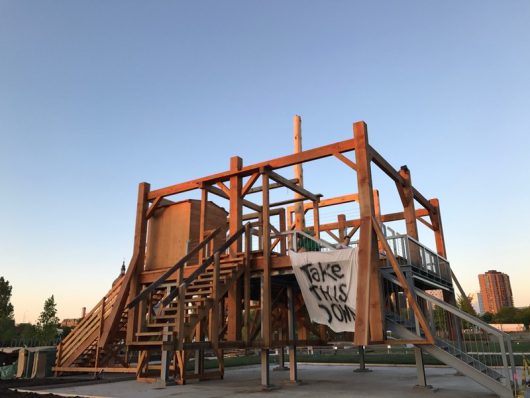
Sam Durant’s Scaffold (2012), Minneapolis Sculpture Garden, before it was dismantled.
- Walker Art Center Destroys Controversial Sam Durant Sculpture. May-June 2017: Minneapolis’ Walker Art Center became the center of a heated controversy over Scaffold, a massive 2012 work by Los Angeles artist Sam Durant meant to create awareness about capital punishment and its disproportionate effect on people of color. Scaffold is based on designs for gallows used in seven U.S. state-sanctioned executions, including 38 Dakota men hung in Mankato, Minnesota in 1862. The installation was not discussed in advance with the local Dakota community, and it sparked a protest and demands for it to be destroyed. After a meeting with Dakota tribal elders, a determination was made to dismantle the sculpture and burn the wood in a ceremony; Durant pledged to not re-create the work, and to transfer his intellectual property rights to the work to the Dakota tribe.
2016
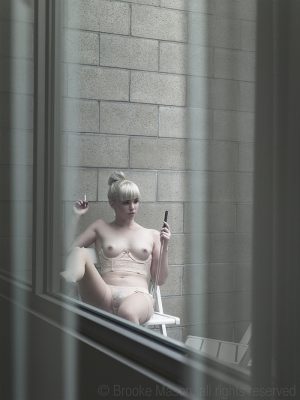
‘Voyeur,’ by Brooke Mason (courtesy the artist)
- West Hollywood Removes Photographs Celebrating Women During Women’s History Month, March-April 2016: Precipitated by an unknown city staff member’s complaint, City of West Hollywood officials remove three works by Los Angeles photographer Brooke Mason from exhibitions celebrating women artists for Women’s History Month. After receiving pressure, they reach an agreement with the artist to exhibit the works.
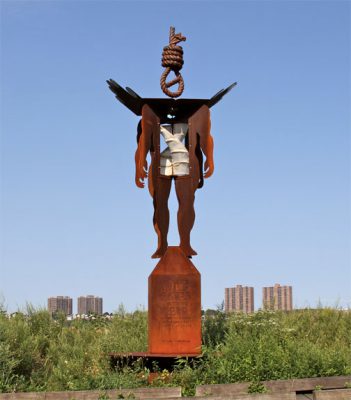
Aaron Bell’s sculpture, ‘Stand Tall, Stand Loud’
- Aaron Bell Public Sculpture Censored by NYC Parks Department, May-June 2016: NYC Department of Parks rejects artist Aaron Bell’s original design for a temporary public sculpture in Manhattan’s Riverside Park, judging its depiction of a noose-like element potentially disturbing to the park’s visitors. In a last minute decision, after receiving pressure, the Department of Parks agrees to display the sculpture with the noose element, as the artist intended. Additional info: Public Art With Slave Imagery Rejected by City Because People Do Pilates in the Park.
- American Nocturne, Elgin, Illinois Mural Removed by City, July 2016: Two passersby notice similarities between American Nocturne, a mural in downtown Elgin, Illinois, and an infamous photograph of a 1930 lynching in Indiana, and share its image on social media. Although the mural stood for a decade along a pedestrian walkway and stirred no controversy, the revelation of its source image sparks protests and a campaign to have the mural removed. It is dismantled and placed in storage. Additional info: Talk about, don’t hide, public art (Op-Ed by Svetlana Mintcheva)
- WPA Paintings Moved from Harvey Hall at University of Wisconsin-Stout, August 2016: The Chancellor at the University of Wisconsin-Stout announces that two of three historic paintings depicting interactions between white traders and First Nations people are to be removed from public view because of their potentially “harmful effect” on students and other viewers. After public criticism, the Chancellor relocates the paintings for display under “controlled circumstances.”
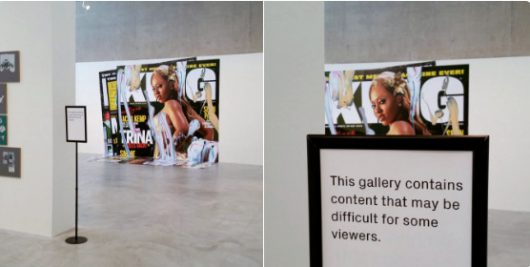
Direct Drive exhibition, Contemporary Art Museum, St. Louis, Missouri
- Contemporary Art Museum St. Louis (CAMSTL) Faces Protests/Calls for Boycott over Exhibition of Racially Charged Artworks, September 2016: The Contemporary Art Museum St. Louis, Missouri, faces protests over Direct Drive, an exhibition by Georgia-born artist Kelley Walker, who appropriates images of African-American history in some of his works. Deemed racially insensitive and demeaning to African Americans, local activists, artists, and museum staffers demand the museum remove the works and that the exhibition curator resign. CAMSTL cordons off the works behind a wall. Soon after, the curator resigns.
- California State University Cancels Race-related Comedy at the Carpenter Center, September 2016: The Carpenter Performing Arts Center at California State University Long Beach is forced to abandon a production of the acclaimed race-centered comedy N*GGER WETB*CK CH*NK after the university administration calls for its cancellation. The university’s decision prompts the resignation of Center’s long-standing Executive Director, Michele Roberge, who refers to the cancellation as an act of censorship.
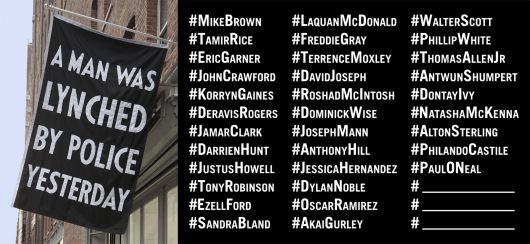
‘A Partial Listing Of People Lynched By Police Recently’ – rejected billboard proposal by Dread Scott
- OUTFRONT Media Rejects Public Art Billboard Proposal by Artist Dread Scott, August-November 2016: Outfront Media rejects artist Dread Scott’s proposal for a billboard displayed at the alternative Kansas City art space 50/50’s Black Lives Matter exhibition on the grounds that it violates their policy against “negative advertising.” The design includes a list of names of those killed in recent police violence juxtaposed with a photograph of Scott’s flag decrying police lynching. When Scott proposes a modified design, (and after receiving pressure), Outfront Media reverses its decision.
- Tillman Hall Threatens to Punish/Expel Student Activist Artist over Protest Artwork, November-December 2016: South Carolina’s Winthrop University threatens one of its students with expulsion over an art installation made in protest of the name of the university’s main building, Tillman Hall. Benjamin Tillman (“Pitchfork Ben”) after whom the building is named, advocated for lynch mobs while serving as governor of South Carolina (1890-94). After being pressured by free speech groups, the university drops its charges against the student. Additional info: Winthrop: No charges filed in case of hanging black figures outside Tillman Hall
2015
- Arts Institutions Cancel Engagements Amidst Protests and Accusations of Racism over Poet Vanessa Place’s Work, May-July 2015: Vanessa Place’s social media performance, consisting of tweeting the novel Gone With the Wind line by line, sparks protests from anti-racist groups. Place is disinvited from public events and shunned by US arts institutions. Additional info: Gone WIth The Wind Tweeter Shunned; Does Tweeting Gone With the Wind Make this Poet Racist?
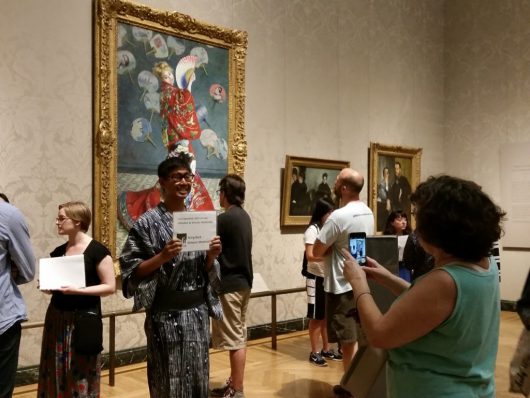
MFA Boston, Kimono Wednesdays protest and counter protestor
- MFA Boston Alters Kimono Wednesdays Event In Response to Protests and Accusations of Racism, July 2015: Boston Museum of Fine Arts faces protests and criticism over “Kimono Wednesdays,” an interactive public event that accompanies Claude Monet’s 1876 portrait La Japonaise. The event includes museum-commissioned replicas of the kimono worn by Monet’s wife in the painting, which visitors can touch and wear. Protesters declare this a form of racist “yellow face…that would compel members of the public to participate in Orientalism.” The museum apologizes and modifies the exhibition with the kimonos remaining on display for visitors to touch, but not to wear. Additional info: NCAC: Kimonos and Controversy; NCAC: Kimono Wednesdays: Was Interactive Art Really Yellowface Orientalism?; NCAC: Boston Museum Responds to Protests
2014
- Emerald Art Center Rejects Artist’s Work from Members’ Exhibition, February 2014: The Board of the Emerald Art Center in Springfield, Oregon, rejects Linda Cunningham’s collage entitled, School Days, from the monthly members’ art show. The collage, which includes school children and bullet casings, is “too controversial” and “inappropriate.”
- Installation Removed for Fear of Offending Viewers, February 2014: Kennesaw State University officials remove Ruth Stanford’s installation, A Walk in the Valley, at the Zuckerman Museum of Art. Officials claim the installation contains content that does not fit the “celebratory nature” of the museum’s grand opening.
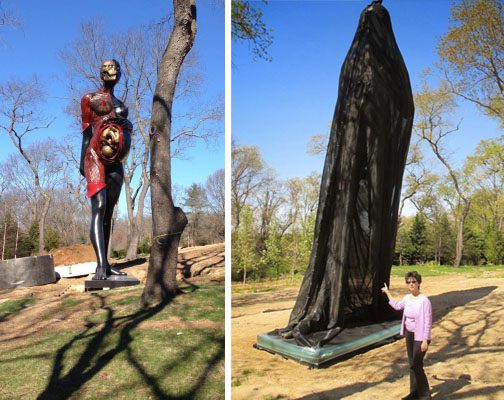
Damien Hirst, ‘The Virgin Mother’ 2005: Before and After.
- Damien Hirst’s The Virgin Mother Covered Up on Long Island, May 2014: Community members of Long Island’s Village of Old Westbury place restrictions on The Virgin Mother, a 33-foot sculpture by Damien Hirst, in the art-filled estate of developer Aby Rosen. A black tarp is placed over the sculpture because the monumental nude pregnant woman was “giving children nightmares.”
2013
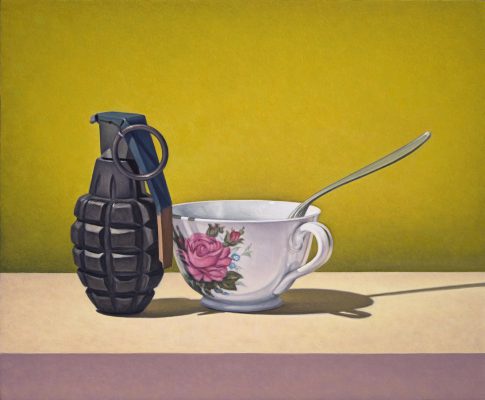
Tom Gregg, ‘Teacup’
- Kansas University Removes Art and Closes Exhibition Hall, July 2013: Dykes Library Interim Director Dr. Vince Loffredo orders the removal of Tom Gregg: Unsold – Grenades, Cute Animals and Bad Apples ahead of its scheduled end date, and closes the exhibition hall permanently. The work featured in Unsold — including paintings of grenades, pistols, and rotten apples — apparently did not support the campus’ “core mission.”
- National Hispanic Heritage Month Censored by County for Nudity, September 2013: The San Bernardino County Government building Board of Supervisors asks artists Armando Aleman and Efren Montiel Jiminez to remove paintings that contain nudity after receiving complaints from people who visit the building. A court case enforces the reinstatement of the paintings.
2012
- John Michael Kohler Art Center Censors Family Exhibition, October 2012: The Art Center removes Betsey Schneider’s photographic series Quotidian due to complaints concerning nudity. The photographs were part of the kids are all right exhibition and are a documentation of Schneider’s daughter growing up that includes images in which she is nude.
2011
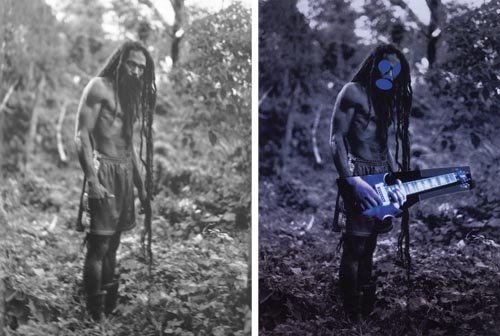
Cariou v. Prince
- Cariou v. Prince: Landmark Copyright and Fair Use Case, March 2011: Judge Deborah Batts rules in favor of Patrick Cariou in the case of Richard Prince’s appropriation of Cariou’s photographs of Rastafarians. An appeals process reverses her decision, and determines that works in Prince’s Canal Zone series are protected under the fair use doctrine.
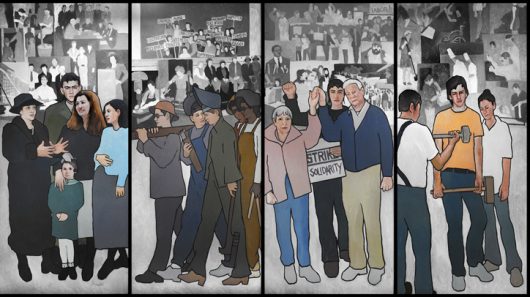
Judy Taylor, ‘History of Maine’ Labor Mural
- Labor Mural removed by Maine Governor Paul LePage, March 2011: Governor Paul LePage orders a mural at the Department of Labor taken down on the grounds that the images are biased against business owners. The mural, by Judy Taylor, showcases Maine’s labor history and includes Rosie the Riveter at the Bath Iron Works, child laborers, and a 1937 shoe mill strike. Additional info: NCAC: President of Maine College of Art Condemns Censorship of Maine Labor Murals
- Sylvia Cossich Goodman Painting Censored for Nudity, April 2011: Administrators at Marin County Civic Center remove a nude painting by Sylvia Cossich Goodman because an employee complains that the piece creates “a hostile work environment.” After the protest, the painting was reinstated.
- MOCHA Cancels Palestinian Children’s Art Exhibit, Sepember 2011: A planned exhibit of artwork by Palestinian youth at the Museum of Children’s Art (MOCHA) in Oakland, CA is cancelled. The artwork depicts children’s perspectives on the Israeli assault during the 2008-09 Gaza conflict. Pictures show a bomb painted with American and Israeli flags crashing into a street filled with dead bodies, helicopters destroying a city, and a boot decorated with a Star of David stomping on a Palestinian flag.
2010
- YouTube Removes Artist Amy Greenfield Videos, February 2010: Video-sharing website YouTube removes many videos featuring nudity, including Amy Greenfield’s dance performance videos. After protests, Greenfield’s videos are restored. As a result, YouTube changes its nudity guidelines to include an exception for artwork.
- Apple Pulls James Joyce’s Ulysses from iPad, June 2010: Enforcing its strict “no-nudity” policy, Apple requests that several pages be removed from an iPad-hosted graphic novel based on James Joyce’s Ulysses. In response to public pressure, the company later allows the application to appear in its original form.

Enrique Chagoya, ‘The Misadventures of the Romantic Cannibals’ (2003), lithographic color codex, 7 1/2 x 90 inches, published by Shark’s Ink; Lyons, CO
- Woman Destroys Enrique Chagoya Print at Colorado Museum, October 2010: A disgruntled woman rips into Enrique Chagoya’s controversial lithograph The Misadventures of the Romantic Cannibals after busting the artwork’s plexiglass case with a crowbar at the Loveland Museum in Colorado. City council members, religious groups and individuals hoped that the public pressure caused by the artwork’s racy religious content would get Chagoya’s piece yanked from the government-funded museum. Part of the lithograph appears to depict a Jesus Christ face on a female body receiving oral sex.
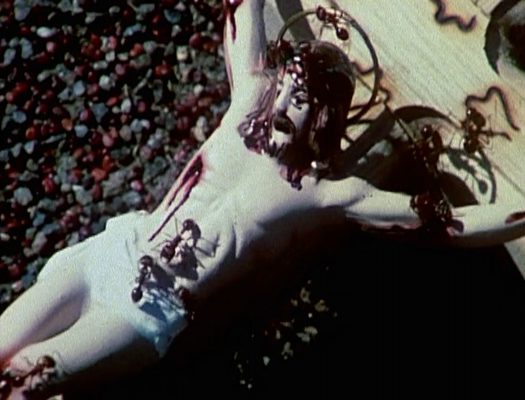
David Wojnarowicz, ‘A Fire In My Belly’ (Film In Progress) film still
- David Wojnarowicz Video Censored, December 2010: The Smithsonian Institution pulls David Wojnarowicz’ video Fire In My Belly from the exhibition Hide/Seek at the National Portrait Gallery.
- LA MOCA Whitewashes Anti-War Mural, December 2010: Los Angeles Museum of Contemporary Art (LA MOCA) director Jeffrey Deitch orders the whitewashing of a museum-commissioned mural by Italian street artist Blu because it depicts coffins draped in dollar bills and is potentially offensive to a neighborhood that includes a Veterans Affairs hospital and a war memorial to Japanese American soldiers.
2009
- Supreme Court Rules That Government Cannot Outlaw Expressions of Animal Cruelty, April 2009: Refusing to remove another form of expression from protection by the First Amendment, the Supreme Court rules in United States v. Stevens that the government lacks the power to outlaw expressions of animal cruelty in videotapes and other commercial media. The decision nullified a 1999 federal law passed by Congress in an attempt to curb animal cruelty by forbidding its depiction.
2008
- San Francisco Art Institute Cancels Adel Abdessemed Exhibit, March 2008: In response to threats of violence directed at staff members and their families by animal-rights activists, The San Francisco Art Institute cancels Don’t Trust Me, an exhibition by Algerian-born French artist Adel Abdessemed consisting of video footage of animals being killed by a single blow from a sledgehammer.
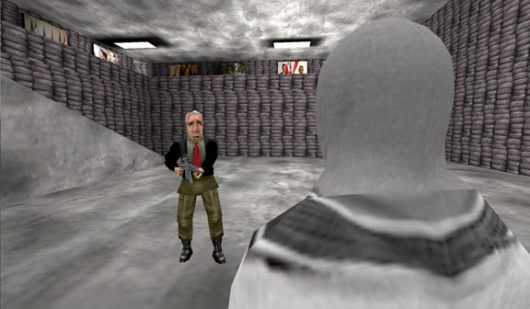
Wafaa Bilal, ‘Virtual Jihadi’ (video game)
- Rensselaer Polytechnic Institute Closes Art Exhibit, March 2008: Rensselaer Polytechnic Institute in Troy, NY closes “Virtual Jihadi,” a video art exhibition by Iraqi-American artist Wafaa Bilal, and announces the creation of a committee to “vet and monitor” artwork on campus after College Republicans vocally oppose the exhibition. The work is then displayed by The Sanctuary for Independent Media, a private exhibition space. But the controversy does not end there: the City Commissioner for Public Works leads a protest demonstration at the opening, and, in a suspicious coincidence, the next day The Sanctuary is closed for a building code violation.
2006

‘Patriot Act’ by Al Brandtner, a sheet of 42 mock 37-cent stamps.
- FBI Investigates Artists at Columbia College Exhibition, March 2006: FBI agents turn up before the public opening of the exhibition “Axis of Evil, the Secret History of Sin” at Columbia College in Chicago, and take pictures of some of the artworks, including Al Brandtner’s Patriot Act, showing President Bush on a mock stamp with a revolver pointed at his head. The agents ask the artists what they intend by their work, and order the museum director to turn over their names and phone numbers. When “Axis of Evil” travels to the University of Wisconsin-Green Bay, the Chancellor orders Patriot Act removed from the show.
- Michigan Withdraws Funding from Ann Arbor Film Festival, April 2006: Michigan State funds for the Ann Arbor Film Festival are withdrawn because of the screening of films that the state deems “objectionable.” AAFF files suit, resulting in the state legislature repealing unconstitutional restrictions on arts funding. The vague speech restrictions include a ban on funding art that contains “depictions of flag desecration” and “displays of sex acts.” Additional info: NCAC: Political Control of Arts Funding in Michigan may Cripple the Arts; NCAC: ACLU Fles Arts Funding Lawsuit in Michigan; NCAC: Ann Arbor Film Festival Wins Settlement from State of Michigan on Free Speech Lawsuit; State Legislature Removes Funding Restrictions; ACLU Michigan: ACLU, Ann Arbor Film Festival File Lawsuit Against Michigan; Michigan Radio: Ten Years Ago, Accusations of Porn:Ann Arbor Film Festival Led Fight for Free Speech
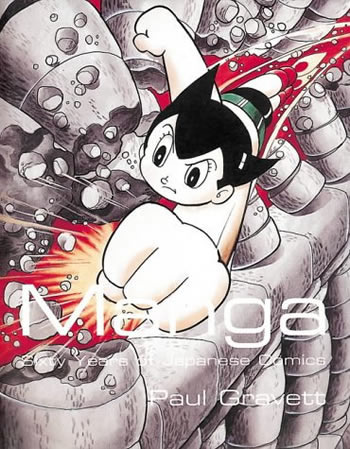
Paul Gravett, MANGA – Sixty Years of Japanese Comics
- San Bernadino County Removes Manga Comic Reference Book from Libraries, April 2006: San Bernardino County Supervisor Bill Postmus orders the removal of the reference book, Manga: Sixty Years of Japanese Comics, from all San Bernardino County public libraries because of several sexually explicit drawings.
- Local Colorado Residents Attack Public Sculpture, August 2006: A public sculpture in Loveland, CO is attacked by local residents because the figures in it are nude. As a compromise, the Visual Arts Commission decides to move the work to a less prominent spot.
2005
The House of Representatives passes a FLAG PROTECTION AMENDMENT giving Congress and state legislatures authority to outlaw the physical desecration of the American flag.
- House of Representatives Passes Flag Protection Amendment, 2005: The House of Representatives passes a Flag Protection amendment giving Congress and state legislatures authority to outlaw the physical desecration of the American flag.
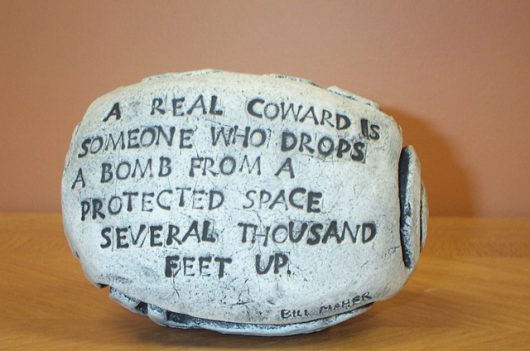
Gayla Lemke’s ceramic work, ‘Hope Stones’
- Lakewood City Manager Removes Artwork from Exhibition, March 2005: Lakewood, CO City Manager Mike Rock, with the support of three members of the Lakewood City Council, orders that a ceramic piece be removed from Gayla Lemke’s sculptural installation, Hope Stones, an array of small ceramic stones bearing quotations on the theme of war and peace. The censored stone features a quotation by Bill Maher: “A real coward is someone who drops a bomb from a protected space several thousand feet up.” City Council members label the exhibition “anti-American” and “anti-military.” The controversial stone is later returned to the show.
- Attorney General Alberto Gonzales Makes Pornography Top Priority, March 2005: Newly appointed Attorney General Alberto Gonzales designates pornography as a Department of Justice top priority alongside terrorism.
- NY Governor Pataki Presses Art Organization to Never Denigrate Families of 9/11 Victims, Sepember 2005: Governor Pataki (NY) presses The Drawing Center and the International Freedom Center, two organizations invited to occupy space at the new cultural complex at Ground Zero, to guarantee that their programming will never “denigrate” America or offend the families of 9/11 victims. The works used to stir up controversy include a detail from Amy Wilson’s A Glimpse of What Life in a Free Country Could Be Like, 2004, an exhibition by Mark Lombardi, and Charbel Ackerman’s tongue-in-cheek powerpoint presentation, Axis of Evil. Eventually, both organizations are ejected. Additional info: NCAC Letter to Lower Manhattan Development Corporation Regarding Arts Organizations at Ground Zero; NYTimes: After its Rejection at Ground Zero, Drawing Center Plans a New Home
2004

Steve Kurtz, Critical Art Ensemble
- Artist Steve Kurtz Investigated for Bioterrorism, April 2004: Steve Kurtz, member of the activist art group Critical Art Ensemble, is investigated for bioterrorism after biological materials are found in his home. Proof that the materials are harmless and part of an art installation dealing with genetically modified foods (scheduled to be shown at the Massachusetts Museum of Contemporary Art) fails to stop the investigation. The installation space at Mass MOCA remains empty over the duration of the exhibition. Kurtz is eventually indicted on minor mail and wire fraud charges. In 2008, the indictment is ruled “insufficient on its face.” Additional info: NCAC: Continuing Investigation of Steve Kurtz Threatens Free Expression; CAE Legal Defense Fund
2003
The Sonny Bono Copyright Term Extension Act, passed in October 2002, keeps Mickey Mouse, who made his screen debut in 1928, from entering the public domain. The law is referred to as the “Mickey Mouse Protection Act” due to Disney’s central role in its passage.
- The Dixie Chicks Banned From Radio Stations, March 2003: The Dixie Chicks are banned from radio stations nationwide after lead singer Natalie Maines criticizes President Bush. At a Louisiana rally, a tractor smashes Dixie Chicks CDs and other paraphernalia.
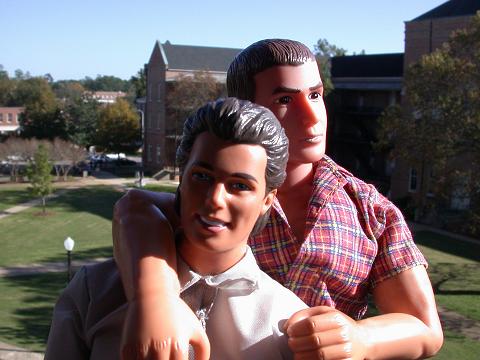
John Trobaugh, G.I. Joe and Ken dolls
- Shelton State Community College Removes John Trobaugh Photos, November 2003: John Trobaugh’s photographs are removed from the photo gallery of Shelton State Community College at the direction of the President who claimed that the images ”created a negative impression” and were “offensive” and “controversial” because they might be interpreted as an endorsement of homosexuality.
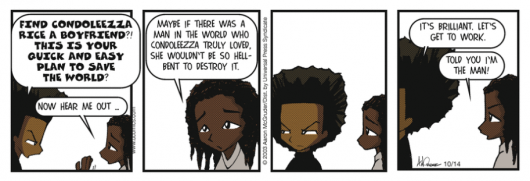
Aaron McGruder, The Boondocks comic strip: ‘Condi Needs a Man’
- The Washington Post Pulls The Boondocks Comic Strip, October 2003: The Washington Post pulls a week’s worth of The Boondock comic strips, the “Condi Needs a Man” series in which Huey and his friend Caesar create a personal ad for U.S. Secretary of State Condoleezza Rice, portraying her as a “female Darth Vader type that seeks loving mate to torture.”
2002
The Department of Justice purchase drapes to cover the two semi-nude art deco statues that have been in the Great Hall of the Department since the 1930s.
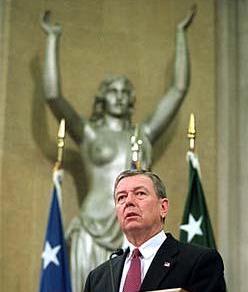
John Ashcroft, Spirit of Justice
- Attorney General John Ashcroft Covers Statue of Justice, February 2002: The Department of Justice purchases drapes to cover the two semi-nude art deco statues that have been in the Great Hall of the Department since the 1930s.
- Artwork Depicting 9/11 Attack Removed From Armory Show, March 2002: Ennio Bertrand’s interactive video Remote Stills/Under Attackis removed from the Armory Show at New York City’s Pier 88 after staff members complain that the continuously-looped images of UA Flight 175 exploding into the World Trade Center are inappropriate in light of the fact that the pier had been used for months as the staging area for attack-related operations.
- The U.S. Supreme Court declares the 1996 Child Pornography Prevention Act unconstitutional (April, 2002).
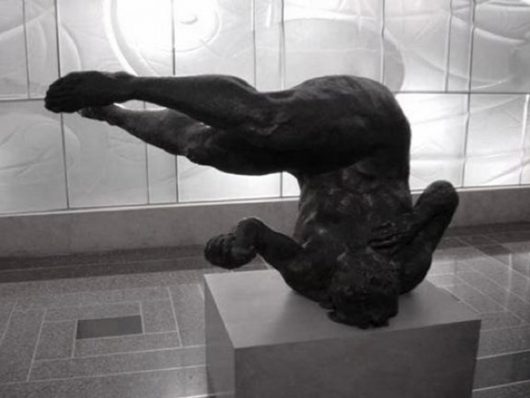
Eric Fischl, ‘Tumbling Woman’
- Rockefeller Center Removes Eric Fischl’s Sculpture, September 2002: Eric Fischl’s sculpture, Tumbling Woman, is covered up and then removed from Rockefeller Center days after its installation because some may find its reference to falling 9/11 victims insensitive. Additional info: Art from the Ashes blog: Eric Fischl’s Tumbling Woman; CBS News: September 11 Sculpture Covered Up
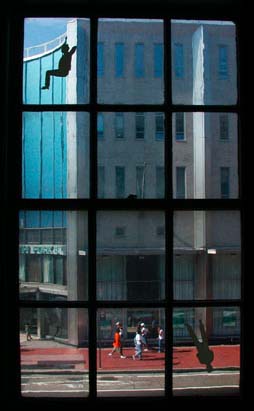
Sharon Paz, Falling (detail)
- Sharan Paz Public Artwork is Removed from Arts Center in Queens, September 2002: City officials remove Sharon Paz’s project, Falling, 2002, in which human silhouettes falling through mid-air are pasted to the windows of the Jamaica Center for the Arts in Queens, NY. Some staff members and public officials decide the work is “insensitive.”
- Jill Friedman’s Photographs of Peace Rally Removed from Hartford Exhibition, October 2002: The Director’s Gallery in Hartford, Connecticut, removes two photographs by artist Jill Friedman from an exhibition. Hartford’s director of human services calls one of the photos “un-American” and orders the removal of both photos after several employees find them offensive. The photographs document a Washington, D.C. peace rally.
- Willits Center for the Arts Refuses to Exhibit Art Critical of Government, October 2002: The Willits Center for the Arts, Mendocino County, CA refuses to exhibit two panels of Evan Johnson’s photographic work, which comment critically on issues of American foreign policy, because city officials would disapprove.
- Supreme Court Upholds The Sonny Bono Copyright Term Extension Act, October 2002: The U.S. Supreme Court upholds the 1998 Sonny Bono law extending copyright to 70 years after the death of the artist (for individuals), and 95 years for corporations. The Sonny Bono law is the result of strenuous lobbying by companies with lucrative copyrights. Often called (derisively) the “Mickey Mouse Protection Act” due to Disney’s central role in its passage, it prevents the original Mickey, who made his screen debut in 1928, from entering the public domain in 2003. The law prevents more than 400,000 other works from entering the public domain.
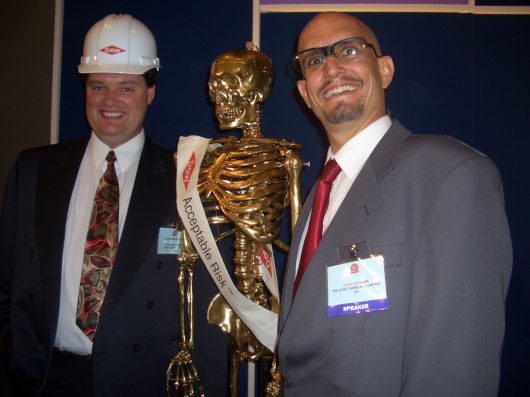
The Yes Men (Andy Bichlbaum), impersonating Dow Chemical
- Internet Provider Denies Service to Thing.net for Hosting Parody Website, December 2002: After receiving legal threats from the Dow Chemical Corporation, Internet access provider NTT/Verio declares it will terminate its contract with Thing.net for hosting a parody press release from the activist artist group, The Yes Men, on their server. The press release was posted on the anniversary of the lethal gas leak in Bhopal, India; the parody site closely resembles Dow Chemical’s real site, which leads Dow to send Verio a Digital Millennium Copyright Act (DMCA) take-down complaint claiming trademark infringement. Additional info: Democracy Now: Yes Men Hoax; DOW Chemical Apologizes for Bhopal
2001

Renée Cox, Yo Mama’s Last Supper
- New York Mayor Guiliani Announces Formation of Decency Committee, February 2001: In response to a work by Jamaican-American artist Renée Cox exhibited at the Brooklyn Museum of Art, New York Mayor Rudolf Guiliani announces the formation of a decency committee to explore the possibilities for controlling the content of art shown in city-funded institutions. The work, Yo Mama’s Last Supper, is a photographic montage consisting of five panels depicting: 11 black men, a white Judas, and a naked black woman (the artist’s self-portrait), all posing in reference to Leonardo da Vinci’s painting The Last Supper. Additional info: Yo Mama’s Last Supper (Wikipedia)

Alex Donis, WAR. ‘Shadow and Sergeant Kooney’ (oil and enamel on plexi)
- LA Cultural Affairs Department Cancels Alex Donis Art Installation, April 2001: Claiming threats of violence, the Los Angeles City Cultural Affairs department (LACAD) cancels War, a painting installation by L.A.-based artist Alex Donis, before it opens at the Watts Towers Arts Center. The exhibition displays a series of paintings featuring fictionalized pairings of LAPD officers and gang members in same-sex dancing poses with companion text from renowned African-American poet and performance artist, Keith Antar Mason.
- U.S. Senate Censors Artist Laura Ferguson, May 2001: Laura Ferguson’s drawings of nudes, featured in a touring exhibition organized by the American Association of Orthopedic Surgeons, are censored when the show comes to the U.S. Senate building in Washington, D.C. Senator Mitch McConnell’s staff director Tamara Somerville affirms that the Senate censors representations of nudity and violence.
- New Guidelines for Decency Standards on the Airwaves, June 2001: The FCC issues new guidelines indicating that innuendo and context are factors in determining whether a record violates its decency standards, regardless of the specific words. Using the new guidelines, the FCC fines two radio stations $7000 each for airing the “clean version” of Eminem’s The Real Slim Shady and Sarah Jones’ Your Revolution. Jones sues the FCC. Under pressure, in 2003, the FCC decides Your Revolution is not indecent.
- NEA Chairman Rejects Grant Application for Documentary Film about Gay Family Life, 2001: NEA Chairman Bill Ivey rejects a grant application for Family Fundamentals, a documentary film by Arthur Dong profiling families with gay adult children. The grant had been recommended by the agency’s media arts panel.
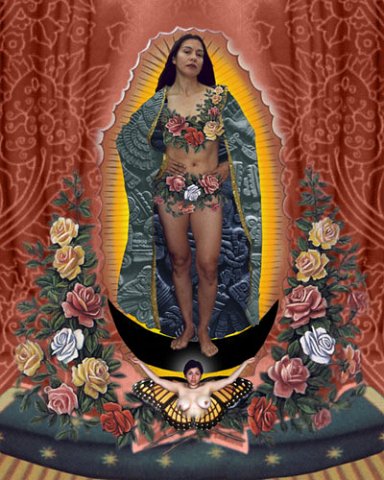
Alma López, ‘Our Lady,’ digital print
- Catholic Groups Attack Work by Artist Alma Lopez, 2001: Catholic groups in Santa Fe, New Mexico attack a digital print by Los Angeles artist Alma López. The Museum of New Mexico Committee on Sensitive Materials recommends that the work remain on display but shortens the duration of the exhibition.
- Museum of the City of New York Censors Exhibition on the History of the AIDS Epidemic, 2001: The Museum of the City of New York censors more than 75% of the images and text in a number of health education posters included in AIDS: A LIVING ARCHIVE, an exhibition about the history of the AIDS epidemic. The Gay Men’s Health Crisis, co-sponsor of the exhibition, acquiesces.
- NEA Chairman Withdraws Fellowship from Artist William Pope L., September 2001: NEA acting chairman Robert Martin rejects a grant to the Maine College of Art for an exhibition of the work of performance artist William Pope L. The grant had been approved by a review panel and by the National Council on the Arts.
- Boondocks Comic Strip Removed, November 2001: The Boondocks Thanksgiving Day comic strip is removed from the Dallas Morning News because it is critical of President Bush.
- The Christ Community Church Stages Book Burning, December 2001: On New Year’s Eve The Christ Community Church of Alamogordo, New Mexico burns Harry Potter and other books, including novels written by J.R.R. Tolkein, Star Wars material, and The Complete Works of William Shakespeare.
2000
The House of Representatives passes a Flag Protection amendment giving Congress and state legislatures authority to outlaw the physical desecration of the American Flag.
The Children’s Internet Protection Act (CIPA) goes into effect. This new law requires public and school libraries receiving federal assistance for Internet connections to install filters on all computers.
- Harry Potter Books Challenged in School Libraries, 2000: School libraries in Michigan, Kansas, Colorado, California and many other states face challenges to Harry Potter books. Protests against the series in Florida result in at least one reading incentive program being canceled.
1999
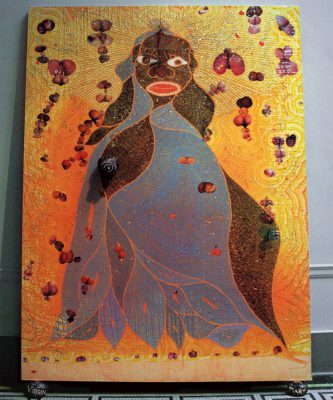
Chris Ofili, ‘The Holy Virgin Mary’
- New York City Mayor Rudy Giuliani Orders Brooklyn Museum to Remove Painting, 1999: Prior to the opening of the exhibition “Sensation” at the Brooklyn Museum of Art, Mayor Giuliani, offended by the “anti-Catholic” content of one of the works in the show, Chris Ofili’s The Holy Virgin Mary, orders the museum to remove it or he will cancel the exhibition. Giuliani then cuts off funding to the museum and threatens to eject it from the building. The museum filed suit in federal court seeking to reinstate funding and prevent the eviction. Judge Nina Gershon rules that Giuliani’s attempt to cut funding and threat of eviction violate the First Amendment. Giuliani appeals; the case is settled during the appeal in March 2000. In the settlement, the city agreed to pay $5.8 million over two years to help renovate the museum’s entry hall. Additional info: PBS News Hour: The Art of Controversy
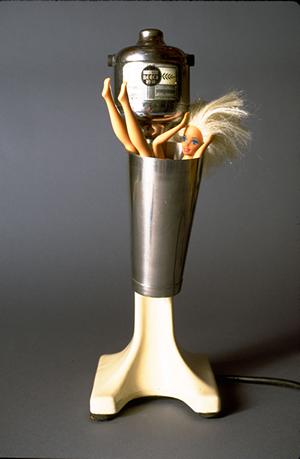
Tom Forsythe, ‘Malted Barbie’ (photograph from the Food Chain Barbie series)
- Toymaker Mattel Unsuccessfully Sues Artist Over Use of Barbie, 1999: Mattel tries to sue artist Tom Forsythe for trademark and copyright infringement over his use of Barbie in his series of photographs, Food Chain Barbie. The Court finds the photographs to be a parody of everything the doll has come to stand for, qualifying them as a fair use. Additional info: Tom_Forsythe (Wikipedia); NCAC blog: Copyright, Thomas Forsythe and Mattel; TJ Center: Art On Trial: Copyright
- NEA chair William J. Ivey, Withdraws Funding for Children’s Mexican Folktale, 1999: Chief of the National Endowment for the Arts, William J. Ivey, withdraws funding for The Story of Colors, a Mexican folktale for children published by Cinco Puntos Press, because the book’s author, Subcomandante Insurgente Marcos, is affiliated with the Zapatista movement in Mexico. Additional info: NCAC and Other National Groups Oppose Censorship of Childrens Book by the NEA
1998
The Child Online Protection Act is Passed. COPA mandates restriction of minors’ access to “harmful to minors” materials commercially distributed over the World Wide Web.
- National Endowment for the Arts v. Finley, 1998: NEA v. Finley was a United States Supreme Court case in which the Court upheld the “decency” standard for federal grants to the arts, requiring the NEA to take into account “general standards of decency and respect for the diverse beliefs and values of the American public” when making grants. The majority decision held that the “decency” standard is only advisory, and cannot be used to censor controversial art or ideas. Additional info: National Endowment for the Arts v. Finley (Wikipedia)
- Catholic League and Others Threaten Manhattan Theatre Club over McNally Play, 1998: Terrence McNally’s Play, Corpus Christi, and the Manhattan Theatre Club, where it was to premiere, face protests and threats from the Catholic League and others objecting to its portrayal of Jesus Christ and the apostles as gay. When one of the theatre’s sponsors withdraws financial support, the Manhattan Theatre Club tries to cancel the production. Under pressure from free speech advocates, including playwrights, directors, and the media, the theatre reverses its decision.
1997
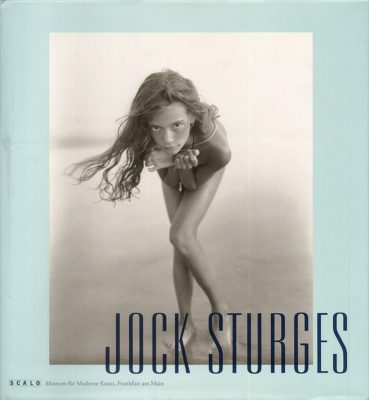
Jock Sturges (Scalo, 1996)
- Jock Sturges Photos Vandalized in Bookstores, 1997: Barnes & Noble is indicted in Alabama and Tennessee on “harmful to minors” charges for selling Jock Sturges’ books after a new book of photographs by Sturges draws protests at Barnes & Noble and Borders Bookstores across the country. Randall Terry, notorious for his anti-abortion “Operation Rescue” tactics, is one of the organizers of the new assault on books and bookstores. Protestors demand the book’s removal for its photos of nude children, some ripping pages from the book in stores, claiming the stores “sexually exploit children.”
- Oklahoma City Police Seize Videos of The Tin Drum, 1997: Videos of Academy Award-winning film The Tin Drum are seized by Oklahoma City police under pressure from Oklahomans for Children and Families (OCAF). Police claim the film violates the state’s child pornography law. Additional info: NCAC: Censorship News: Oklahoma City Censorship Battle
1996
The Communications Decency Act prohibits posting “indecent” or “patently offensive” materials in a public forum on the Internet, including web pages, newsgroups, chat rooms, or online discussion lists. The Child Pornography Prevention Act outlaws all depictions (inclusing computer simulations) of those “appearing to be” minors engaging in sexual activities.
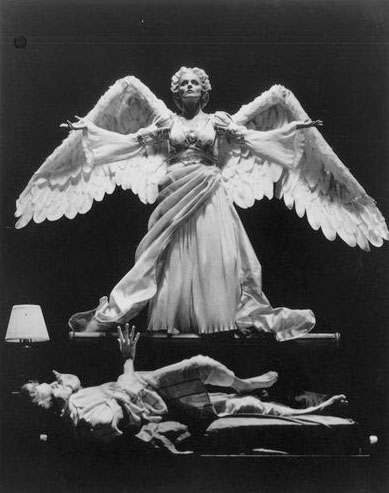
The original 1990s Broadway production of Tony Kushner’s Angels in America (Photo credit Joan Marcus)
- The Blumenthal Arts Center in Charlotte, NC is Attacked for Production of Tony Kushner’s Angels in America, 1996: The Mecklenberg County Commission votes to abolish Charlotte Arts and Sciences Council, which had an annual budget of $2.5 million. The vote is a response to conservative outrage over the Council’s support for the staging of Angels in America. Additional info: Angels in America (Censorpedia);
1995
The U.S. Senate narrowly rejects a Constitutional Flag Protection Amendment.
- The Senate Rejects Constitutional Amendment to Outlaw Desecration of the Flag, 1995: The amendment, a broader version of which had already passed the House in the six-year political battle pitting the values of patriotism against the values of free speech, is intended to circumvent a 1989 Supreme Court ruling that flag burning by protesters is a protected form of political speech. The amendment declares, “The Congress shall have the power to prohibit the physical desecration of the flag of the United States.”

Enola Gay exhibit
- Smithsonian Institution Cancels Controversial Program, 1995: Under extensive pressure from the Air Force Association and Congress, the Smithsonian cancels a program planned by The National Air and Space Museum: “The Last Act: The Atomic Bomb and the End of World War II.” The program questions whether dropping the atomic bomb on Hiroshima was necessary, and featured photos an artifacts belonging to victims. In lieu of the planned exhibition, the restored forward fuselage of the Enola Gay, the B-29 that dropped the bomb, is put on display through 1998. Additional info: Enola Gay Controversy sites
1994
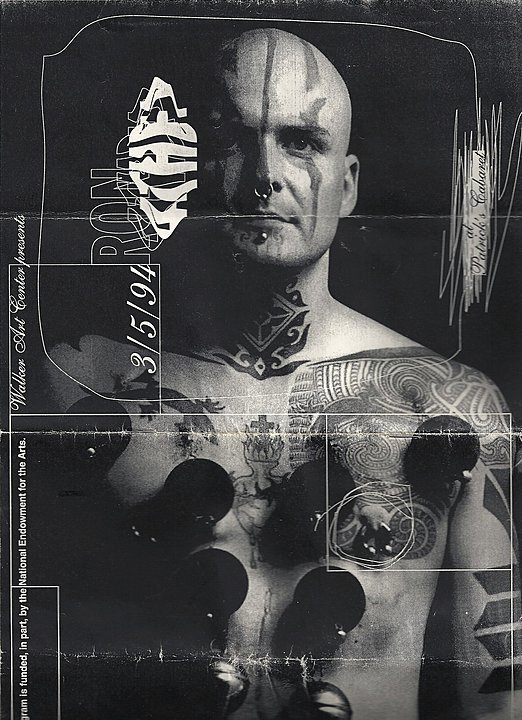
Ron Athey, ‘Four Scenes From a Harsh Life’ (poster for Walker Art Center performance)
- The National Endowment for the Arts is Attacked for Funding the Walker Art Center, 1994: The Walker Art Center in Minneapolis hosts a performance by HIV-positive artist Ron Athey, who uses ritual piercing and scarification to address issues relevant to AIDS, body image, and homophobia. Additional info: Art21 Magazine: Blood Work; Walker Art Center Magazine: Ron Athey: Blood Polemic, Post-AIDS
- Owner, Manager and Clerk of The Pink Pyramid Arrested For Renting Pasolini Film, 1994: The owner and employees of The Pink Pyramid, a small Cincinnati gay and lesbian bookstore, are charged with “pandering obscenity” under Ohio State law for renting out Pier Pasolini’s film Salo. Additional info: Salo or 120 Days in Sodom (Censorpedia);
1991
- The Pentagon Issues Rules Severely Limiting Media Access to Persian Gulf War, 1991: The Pentagon establishes a system for covering the Persian Gulf War that imposes strict limitations on journalists; print and television combat coverage is carried out exclusively through groups of reporters, called ‘pools’ assembled and escorted by the military. The reports are then subjected to a “security review” by the military before being disseminated in Riyadh, Dhahran, and Washington, to feed newspaper, news agency, magazine and television reports.
- Birmingham Public Library, Alabama, Removes Drawings by Teresa and Jean Campbell from Exhibition, 1991: The drawings show a mother breast-feeding her baby and are described by the artists as a celebration of motherhood. Library officials deem the works “not appropriate.” After public outcry the work is restored. Additional info: Momart (Censorpedia)
1990
The Supreme Court upholds rulings that the Flag Protection Act of 1989 is unconstitutional. A proposed Flag Protection Amendment falls short of the two-thirds approval required to amend the Constitution.
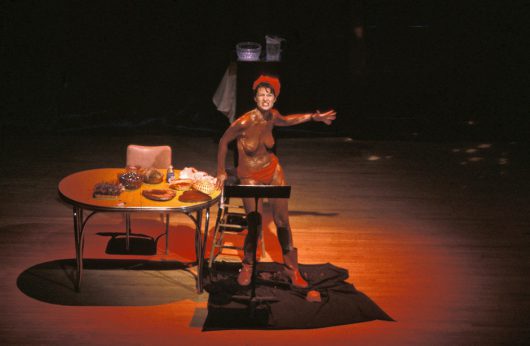
Karen Finley, ‘We Keep Our Victims Ready,’ 1990
- The National Endowment for the Arts Grants for the “NEA Four” are Vetoed, 1990: NEA grants to Karen Finley, Tim Miller, John Fleck, and Holly Hughes (“The NEA Four”) are vetoed by chairman John Frohnmayer after having been recommended by the agency’s peer review panel. Three of the rejected artists are gay and deal with homosexuality in their work; the fourth, Karen Finley, is an outspoken feminist. In 1993, courts rule in their favor and all receive compensation surpassing their grant amounts. Additional info: LA Times: NEA Chief Defends Her Grant Vetoes (May 29, 1992); NEA_Four (Censorpedia); NEA_Four (Wikipedia)
Congress passes an amendment which requires that all NEA grants take into account “general standards of decency and respect of the diverse beliefs and values of the American public.”
Joseph Papp, director of the New York Shakespeare Festival, rejects a $50,000 NEA grant because of its requirement that grantees sign a statement that they will not produce “obscene” work.
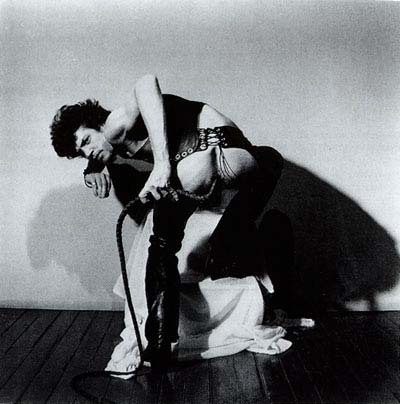
Robert Mapplethorpe retrospective, CAC
- Controversy at the Contemporary Arts Center of Cincinnati over Robert Mapplethorpe Retrospective, 1990: A local sherriff stages a raid on a Robert Mapplethorpe retrospective at the Contemporary Arts Center of Cincinnati (CAC) and seeks indictment of museum director Dennis Barie and CAC on obscenity charges. The case goes to trial. Both Barrie and CAC are aquitted; Barrie leaves CAC shortly afterwards. Additional info: 25 years later: Cincinnati and the obscenity trial over Mapplethorpe art; Read more: Mapplethorpe Obscenity Trial: 1990 – Obscenity Or Art?, Suggestions For Further Reading – Exhibit, Cincinnati, Cac, and Barrie
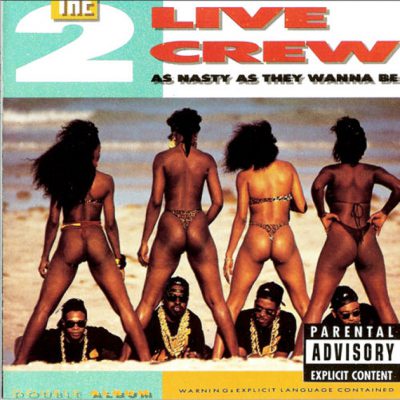
2 Live Crew, ‘Nasty As They Wanna Be’ (album)
- Sale of 2 Live Crew Album Banned in Florida, 1990: Broward County, FL, bans sale of rap group 2 Live Crew’s album Nasty As They Wanna Be. The Album is found obscene by a federal judge. The decision is reversed on appeal.
- The National Endowment for the Arts Pulls Funding for David Wojnarowicz Exhibition, 1990: Under pressure from the Rutherford Institute, the NEA pulls funding for the catalogue Tongues of Flame, for an exhibition of AIDS-related work by Wojnarowicz at Illinois State University. Additional info: Tongues_of_Flame_(Censorpedia); Washington Post: NEA Target of New Lawsuit; UPI: Southern Baptists Threaten Action on NEA
1989
Fall of the Berlin Wall
- Ayatollah Khmeini Issues Fatwa Against Author Salman Rushdie, 1989: Ayatollah Khomeini, the First Supreme Leader of Iran, issues a fatwa against British Indian novelist Salman Rushdie on charges of blasphemy for his novel The Satanic Verses on 15 February, 1989. The Ayatollah calls for the death of the book’s author along with all those “involved in its publication.” The U.S. Senate issues a resolution condemning Khomeini’s fatwa, and declares its “commitment to protect the right of any person to write, publish, sell, buy, and read books without fear of intimidation and violence.”
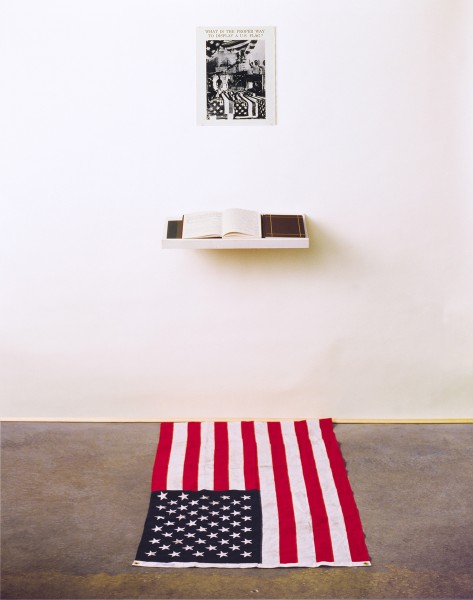
Dread Scott, ‘What Is the Proper Way to Display a U.S. Flag?’
- Dread Scott installation, What Is the Proper Way to Display a U.S. Flag? is Attacked, 1989: A student exhibition at the School of the Art Institute of Chicago (SAIC) is attacked for its inclusion of Dread Scott Tyler’s installation, What Is the Proper Way to Display a U.S. Flag? A group led by Republican Senator Walter Dudycz, and including representatives from veterans’ organizations, files a suit to close down the show. The judge dismisses the suit, reminding the court that works of art are protected under the First Amendment. State funding for SAIC is cut and many benefactors pull donations.
THE FLAG PROTECTION ACT, 1989: Legislation is introduced in Congress to prohibit willfully displaying the U.S. flag on the floor or ground. The U.S. Supreme Court decision in Texas v. Johnson upholds the First Amendment right to burn the flag as symbolic political speech. The Flag Protection Act takes effect. Subsequent flag desecration charges are dismissed on the grounds that the Flag Protection Act is unconstitutional.
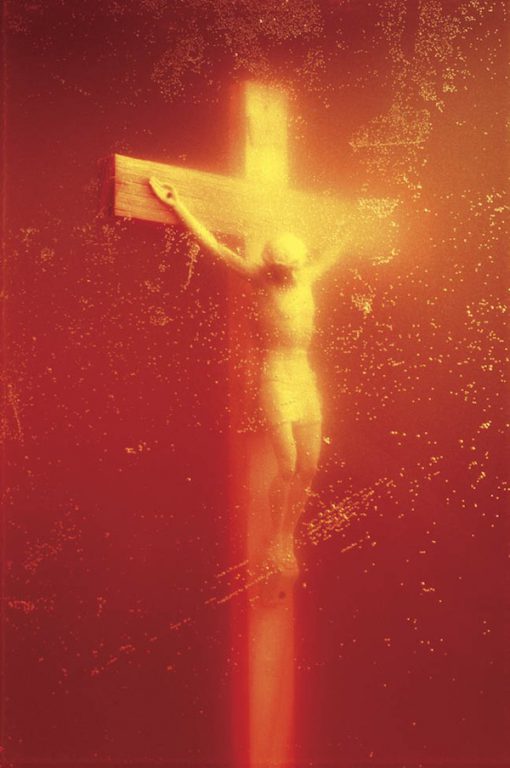
Andres Serrano: ‘Piss Christ’
- Director of American Family Association Attacks Andres Serrano’s Piss Christ, 1989: Reverend Donald Wildmon, the Director of the American Family Association, attacks Andres Serrano’s Piss Christ in a wide direct-mail campaign. In response, Senator Alphonse D’Amato denounces the work in a public statement in Congress. In a letter to acting National Endowment for the Arts (NEA) Chairman Hugh Southern, signed by 23 senators, D’Amato calls for a review of NEA procedures for allocating grants to artists. The letter calls Serrano’s work “shocking, abhorrent, and completely undeserving of any recognition whatsoever”; the issue, it says, is “not a question of free speech” but “a question of taxpayers’ money.”
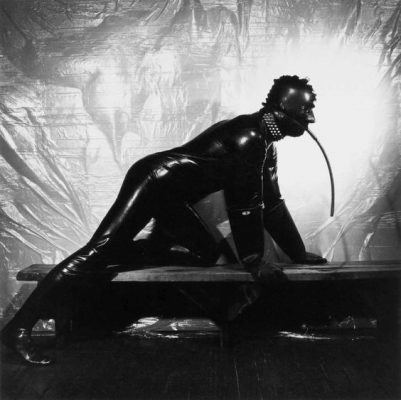
Robert Mapplethorpe (1946-1989) ‘Joe’ 1978
- NEA Support Criticized for Robert Mapplethorpe Retrospective, The Perfect Moment, 1989: Representative Richard Army (R-Tex) and one hundred other members of Congress criticize NEA support for Robert Mapplethorpe’s retrospective, The Perfect Moment, organized by the Institute of Contemporary Art at the University of Pennsylvania in Philadelphia. The Corcoran Gallery of Art in Washington, DC cancels The Perfect Moment.
AN AMENDMENT PASSED BY THE SENATE WOULD BAN FUNDING for the South Eastern Center for Contemporary Art in Winston-Salem, NC and the Institute of Contemporary Art in Philadelphia (ICA) for five years, in reaction to their displaying the work of Andres Serrano and Robert Mapplethorpe respectively. The amendment is eventually dropped. The NEA Budget is cut by $45,000, which equals the amount that had gone to fund Serrano and the Mapplethorpe retrospective.
An addition to the NEA appropriations bill bans funds appropriated by the National Endowment for the Arts or Humanities from being used to support “materials which in the judgement of the NEA…may be considered obscene,” including “depictions of sadomasochism, homoeroticism, the sexual exploitation of children, or of individuals engaged in sex acts, which, taken as a whole, do not have serious literary, artistic, political, or scientific value.” A federal court invalidates the amendment in 1990 as unconstitutionally vague and chilling the excercise of First Amendment rights.
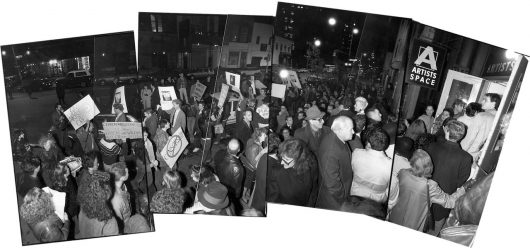
Artists Space Protest, 1989
- NEA Chair Pulls Funding from AIDS-related Exhibition, Witnesses: Against Our Vanishing, 1989: NEA Chair John Frohnmayer pulls funding from Witnesses: Against Our Vanishing, an AIDS-related exhibition at Artists Space in New York. Following an outcry from the arts community, Frohnmayer restores the grant for the exhibition, but with the stipulation that funds cannot be used for the catalogue.
- San Diego Vetoes Grant for Billboard Project, Welcome to America’s Finest Tourist Plantation, 1989: The San Diego City Council’s Public Services and Safety Committee vetoes a grant to Installation Gallery, a local alternative art space, for its coordination of Welcome to America’s Finest Tourist Plantation, a billboard project by San Diego artists David Avalos, Louis Hock, Elizabeth Sisco, and Deborah Small. The billboard contains images of police arresting illegal immigrants and undocumented workers. Additional info: Public Art at Work: Democracy Untested is Democracy Denied
####


